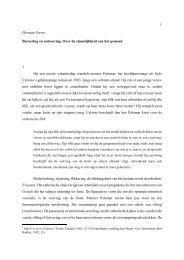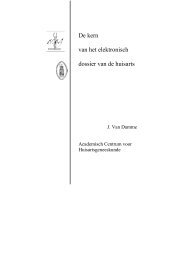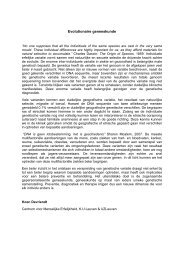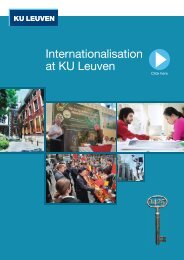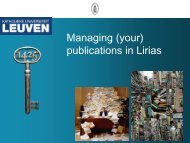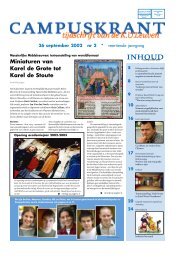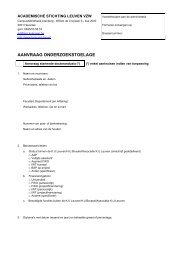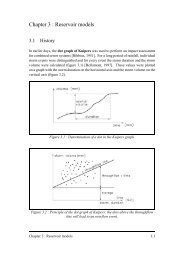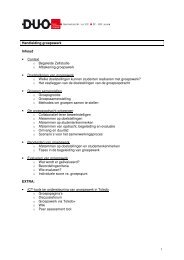EQUALITY GUIdE - KU Leuven
EQUALITY GUIdE - KU Leuven
EQUALITY GUIdE - KU Leuven
You also want an ePaper? Increase the reach of your titles
YUMPU automatically turns print PDFs into web optimized ePapers that Google loves.
Chapter 2 ! Career paths: recruitment ! promotion ! dismissal 97<br />
vacancy. The foregoing has already showed that no consensus has yet been reached in<br />
the debate on neutralization or differentiation. Consequently, implicit discrimination in<br />
language remains possible. While the French-speaking Community decided on 21<br />
June 1993 that all job titles should be feminized, the Flemish Community stated that<br />
the Language Union (de Taalunie) -rather than the government- had to make a decision<br />
in the matter. Because the gender issue concerning the Dutch-language vacancies<br />
is especially related to the labour market in Flanders and the Netherlands, a joined<br />
decision was made by the committee of ministers of the Language Union on 22 October<br />
1996. They stated that there would be no compulsory feminization of the Dutchlanguage<br />
job titles. The members of the Language Union believe that language follows<br />
social evolutions spontaneously and that the language users can rarely be forced to<br />
change their everyday language. According to the Language Union, the language users<br />
will benefit more from well-organized sensitization that will help the neutral form to lose<br />
its male connotation in time.<br />
3.2.3. Vacancy text<br />
A vacancy can be perceived as a text consisting of two parts. Whereas the first part<br />
consists solely of the job title, the second part comprises the actual text, specifying the<br />
profile and the competences of the candidates, as well as giving more information<br />
about the position in question. Even when using a gender-neutral job title, the vacancy<br />
may seem to focus on men rather than women (or vice versa) by the way candidates<br />
are addressed or by the job description.<br />
The first problem concerns the use of unmarked masculine job titles, because the form<br />
of address that is used may give a text unintentionally a masculine character (e.g. ‘Van<br />
de expert (m/v) wordt verwacht dat hij zijn dossiers snel behandelt’ [The expert (m/f)<br />
has to make sure that he deals with his documents swiftly]). The use of ‘he/she’ and<br />
‘his/her’ would unnecessarily overload the text. The possessive pronouns should be<br />
replaced by an article (the documents). By addressing the candidates with ‘you’ (in<br />
Dutch one can use ‘jij’ or the more formal ‘u’), one can avoid the use of a gender-specific<br />
pronoun (e.g. ‘Er wordt verwacht dat u uw dossiers snel behandelt’ [As an expert<br />
you have to make sure you deal with your documents swiftly]). A second solution is<br />
the use of plurals (e.g. ‘Van experts wordt verwacht dat zij hun dossiers snel behandelen’<br />
[Experts are expected to deal with their documents swiftly]).<br />
The second problem refers to the requirements (profile, competences) the candidates<br />
have to meet. It is now generally recognized that most women only tend to apply for a<br />
position when they meet the majority of the requirements. Consequently, a long list of<br />
high demands would indirectly exclude potential female candidates 109 . Furthermore,<br />
there is evidence to suggest that men and women tend to be attracted to different aspects<br />
of requirements or working conditions. For instance, more women than men will<br />
109 Dienst Emancipatiezaken, Genderneutrale functiebenamingen:<br />
http://www.emancipatiezaken.be/page.asp?page=3.



